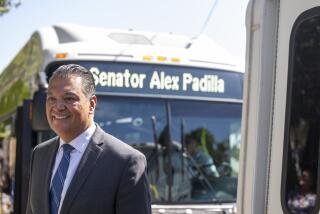Transport of Rocket Fuel Launches the Politicians
Los Angeles Mayor Tom Bradley held a City Hall news conference last Tuesday to announce that he had negotiated an agreement with the U.S. Department of Defense to keep highly toxic rocket fuel off the congested Ventura Freeway.
At the same time, Assemblyman Richard Katz (D-Sepuvleda) was dispatching aides to tell the news media that the California Highway Patrol was removing designation of the Ventura Freeway as a route for the transport of rocket fuel to Vandenberg Air Force Base. On the same day in Washington, Rep. Howard L. Berman (D-Panorama City) was preparing to testify about the rocket fuel shipments before a House subcommittee.
In the weeks following disclosure in The Times that rocket fuel trucked to Vandenberg passed through metropolitan Los Angeles and other communities, elected officials at the city, county, state and federal levels seemed to be outdoing one another to respond to the potential hazard.
They did so, said many of those involved, because the circumstances offered a rare combination: an issue of public safety presenting both the opportunity for a relatively easy fix and a singular lack of political risk in acting forcefully.
“It is the kind of thing where people don’t have to stick their toe into the water to see if the water’s fine,” said Kam Kuwata, a California political consultant. “They know they can jump in.”
“Everyone in the world is jumping on an issue that looks like a no-lose political situation,” Katz said. “There is no one advocating the rocket fuel side.”
No one faulted the politicians for demanding action in the face of possible danger to the public. But the list of those drafting legislation, holding hearings and testifying before government committees reads like a Who’s Who of Southern California officeholders, especially those who may seek higher offices.
At last count, those involved included five Los Angeles City Council members, the mayor, City Atty. James Hahn, three Los Angeles County supervisors, Katz, and six congressmen. Among them were three prospective 1989 mayoral candidates--Bradley, City Councilman Zev Yaroslavsky and Hahn.
Hearings were held or scheduled by county and state officials to examine the broad safety questions involved in transporting hazardous chemicals through metropolitan areas. A House subcommittee examining the issue is to hold a hearing Monday in Los Angeles.
Officials interviewed last week emphasized that they had responded to a real danger, with some recalling the tragedy in Bhopal, India, when deadly gas leaked from a Union Carbide India Ltd. pesticide plant, killing an estimated 2,000 people.
By Friday, the competing interests had led to tension. Katz, who chairs the Assembly Transportation Committee and is head of a new Assembly committee that will explore the dangers of transporting hazardous materials, expressed anger that a House subcommittee had refused to schedule him as a witness at Monday’s hearing.
“We were told they put no local elected officials on the agenda,” Katz said. “You talk about a road show to look involved. That’s what the congressional folks are doing.”
Others familiar with the rocket fuel issue said last week they found the swift involvement of officials somewhat curious. The fuel destined for Vandenberg, nitrogen tetroxide, had been transported on the Ventura Freeway for many years. The Times had written an article about it in 1983 and, with the exception of a few inquiries, it drew little attention.
Legislators or their spokesmen said they had no previous knowledge that the fuel was being shipped through Los Angeles on the Ventura Freeway. It was also shipped on freeways through Pasadena and Glendale, but the official outcry was by the far the loudest from Los Angeles.
“We were not aware,” said Fred MacFarlane, Bradley’s press secretary. “Nobody was, to the best of my knowledge.”
“Unfortunately, it took a Los Angeles Times article to wake everybody up,” said Yaroslavsky, who was among the first to jump on the bandwagon. He urged state and federal officials to reroute the rocket fuel off the Ventura Freeway two days after The Times article appeared. “The local people who learned about it for the first time came unglued.”
One official who had acted earlier was Rep. Anthony C. Beilenson (D-Los Angeles), who contacted City Fire Marshall Craig G. Drummond about the problem in 1983. In a June, 1983, letter to Beilenson, Drummond said it would be helpful if federal agencies “provide early notification of rocket fuel transportation . . . directly to local fire agencies along the designated route.”
The rocket fuel shipments were before the public on another front in 1983. Sen. Gary K. Hart (D-Santa Barbara) sponsored a bill in the Legislature that restricted nitrogen tetroxide shipments to five so-called “explosive routes,” including the one that was used through Los Angeles.
“Sen. Hart was never happy about the situation but it was one that he seemed to be relatively alone on,” said Joe Caves, Hart’s legislative assistant.
More to Read
Sign up for Essential California
The most important California stories and recommendations in your inbox every morning.
You may occasionally receive promotional content from the Los Angeles Times.









